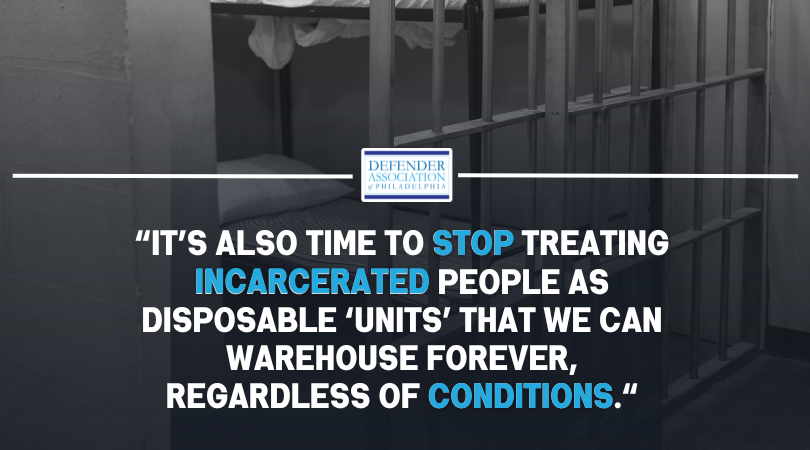Introduction
District Court Judge Gerald A. McHugh’s ruling holding Philadelphia’s prisons in contempt for for the City’s inability to provide a safe, secure, and civilized environment for our incarcerated citizens is completely justified. However, it’s a grim reminder that the Philadelphia Department of Prison’s (PDP), currently understaffed by 800 Correctional Officers, cannot ensure the safety of our citizens awaiting trial or serving sentences.
PDP is required to receive and hold people who have been remanded to their custody by the courts, whether they’re awaiting trial, being held on detainers for minor infractions, or serving a sentence. It is incredibly naive to think that the PDP will hire 800 corrections officers any time soon. Therefore, it is crucial that other system stakeholders, including the First Judicial District (FJD), the Department of Probation, and the District Attorney’s Office (DAO) work with us to address this humanitarian crisis.
Defender Association's Policy Recommendations
As stakeholders, we must commit to reducing the jail population. We recommend strategies to decrease reliance on county incarceration for public safety, starting with reducing or eliminating ‘short-term’ admissions to county jail. These brief stays do not improve public safety and may even decrease it by destabilizing individuals and their families.
By addressing the following policies, we can reduce these admissions and decrease the jail population and strain on prisons without compromising public safety [click the + to view each recommendation]:
Revising the DAO’s current bail practice asking for one dollar less than $ 1 million.
This practice subverts due process by using an unattainably high bail amount as a proxy for holding without bail. Overusing the $1 million bail recommendation diminishes its meaning, forcing bail commissioners to make detention or release decisions without a meaningful DAO recommendation. Unable to rely on this signal, commissioners set higher bail amounts, delaying the actual decision and leading to detention until a judge reviews the bail. Many people at PDP are held initially because they cannot pay bail, often released within 14 days when bail is lowered or funds are raised. This process causes unnecessary detention, discrimination against the poor, family and community destabilization, and an overburdened prison system.
Review and Reform the Court’s bail setting practices.
The City presented evidence that in May 2024, 49 people were admitted to jail and released the same day another 114 were released within 24 hours; 138 within two to four days; and 234 within five to fourteen days. These numbers demonstrate that these individuals are making bail quickly, resulting in unnecessary strain on the jail's limited staff and clogging the jail admission system. The first five days in jail are the most expensive ones for the jail’s medical and other systems and research demonstrates that even periods of detention of 3 days are correlated with increased short and long term rates of re-arrest.
Ceasing the Department of Probation and the FJD’s practice of holding people on technical violations only.
There are currently over 100 people sitting in jail because of a technical violation.
Ensuring that the full spectrum of non-financial conditions of release are available at the first detention review.
Empowering bail commissioners to impose non-financial conditions of release, such as house arrest or GPS monitoring, at preliminary arraignment can prevent unnecessary detention. Although use of these tools raise other concerns, earlier access can streamline reviews and reduce detention. Currently, such conditions cannot be set until a judge reviews the initial bail. Providing these alternatives before jailing the arrestee will decrease the jail population and reduce the use of prison resources.
Releasing medically vulnerable detainees aged 65 or older.
Many of those incarcerated people 65 or older pose no threat to public safety. They can–and should–be released safely.
Investing in community-based substance use treatment programs.
Incarcerating drug-addicted people poses significant risks to their health and safety. Providing access to these programs is crucial to reducing their incarceration. The lack of proper treatment, access to medications, and support for withdrawal symptoms and other medical issues related to substance use can lead to severe complications and death. Investment in comprehensive, community-oriented programs will ultimately reduce the cycle of addiction and incarceration.
Download a printable version of the policy here
A Shift in Mindset
Overlooking the Philly jails, an electronic billboard on I-95 advertising Eastern State Penitentiary flashes the message: “Old Prison/New Ideas.” We need to embody the spirit of this slogan if we’re going to make these and other needed changes. We also need to understand that these changes will require a significant investment of time and resources beyond what city funds and the PDP alone can accomplish. Meaningful and lasting reform also requires a shift in mindset by other system stakeholders. We can’t continue to behave as if this is solely PDP’s crisis to solve. We need cooperation from every judicial system stakeholder to ensure we’re protecting public safety while keeping many of our citizens from ever hitting the admissions door of the jail.
We need to recognize the humanity of incarcerated people, and stop treating incarcerated people like “units” to be locked away indefinitely. These are men and women with families and communities that they will eventually return to. We should ask ourselves, how will what they experience behind prison walls impact the kind of citizens they are when they go home? We must also remember that the horrible conditions in the jails don’t just impact the incarcerated. Every day that conditions don’t improve is another day of needless health and safety risks for prison employees, most of whom are Black and Brown Philadelphians.
As we did during the COVID-19 emergency, the Defender Association is again ready to collaborate with our fellow stakeholders to come up with bold and creative solutions that protect the rights and lives of those in our city's custody.










